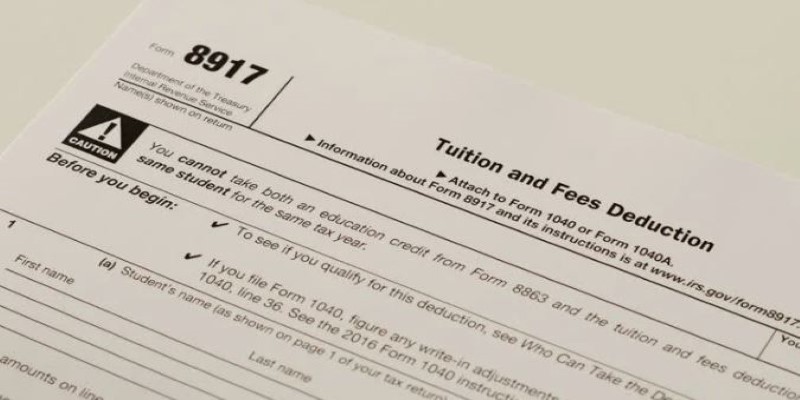Common IRS audit Triggers: How to Keep Your Tax Return in Check
Dec 16, 2024 By Susan Kelly
The U.S. tax system can be complicated, and an IRS audit looms on the horizon. Audits are rare, but there are things you can do to increase your likelihood of being checked.

Knowing what common audit triggers are will help you take preventative measures to lower your risk and make sure your tax return is correct and compliant.
6 Common Red Flags to Avoid on Your Tax Return
Filing your taxes can be stressful enough without the added worry of an audit; here are six common red flags to avoid on your tax return to help you stay in the clear.
Accurately Reporting All Income
Failing to report all your income is one of the most straightforward ways to attract IRS attention. All your income statements W2s and 1099s are sent to the IRS, and they are matched against your tax return. Further examination can result from discrepancies. For example, if you get income from more than one placesay by doing freelance work or investment earningsmake sure they are on track. Omitted even small amounts can raise red flags.
The IRS's automated system compares income reported by employers and other entities with what you report. If theres a mismatch, youre more likely to trigger an audit. Even accidental errors, such as entering the wrong figure, can lead to complications. To avoid this, double-check every income statement and consider using tax software that automatically matches forms to your return. Accuracy here is vital to prevent unnecessary scrutiny.
Claiming Excessive Charitable Deductions

Charitable contributions are commendable and can provide tax benefits. However, claiming disproportionately large deductions compared to your income can raise suspicion. The IRS has benchmarks for average charitable donations relative to income levels. If your donations significantly exceed these averages, it's essential to have thorough documentation, including receipts, and, for non-cash contributions over 500, a completed Form 8283.
The IRS uses algorithms to compare charitable contributions against your income. For instance, if your income is around 50,000 and youre claiming donations of 15,000, this could raise eyebrows. To safeguard yourself, always keep detailed records of your donations. This includes acknowledgment letters from charities and receipts for non-cash items. If audited, you may need to prove not only that you made these donations but that they were valued correctly.
Reporting Large Business Losses
If you're self-employed or own a business, consistently reporting substantial losses, especially if they offset other income, can be a red flag. The IRS distinguishes between legitimate business losses and activities that resemble hobbies. According to IRS rules, a business must show a profit in at least three of the past five years to qualify as a for-profit venture.
If your business has yet to make a profit in a while, be prepared to demonstrate that it's operated professionally. This means keeping business and personal finances separate, maintaining accurate records, and having a clear business plan. Additionally, consult with a tax professional if you need clarification on whether you're eligible to claim a loss, as an incorrect claim could be grounds for further investigation.
Claiming Home Office Deductions

The home office deduction is available to those who use a portion of their home exclusively and regularly for business purposes. However, misuse or overstatement of this deduction can attract IRS attention. Ensure that the space you claim is used solely for business and that you have accurate measurements and records to support your deduction.
The IRS has strict rules on what constitutes a home office. Simply working from your kitchen table doesnt qualify. To safely claim this deduction, you need a dedicated space thats used exclusively for work. Moreover, calculate your deduction carefully based on square footage, and keep all receipts for expenses associated with the upkeep of this area. The home office deduction can be valuable, but it needs to be claimed cautiously to avoid drawing attention.
Claiming High Deductions Relative to Income
Deductions that are unusually high compared to your income can prompt a closer look from the IRS. This includes deductions for medical expenses, casualty losses, or unreimbursed employee expenses. While these deductions are legitimate, ensure they are well-documented and justifiable. For example, if you claim significant medical expenses, retain all receipts and a clear explanation of the necessity of the costs.
The IRS uses statistical models to compare typical deductions based on income level and profession. Large deductions for expenses uncommon to your income bracket can trigger closer examination. If youre claiming extensive medical or business expenses, be ready to provide receipts, records, and explanations of necessity. The goal is to claim legitimate deductions without stretching the limits, as this can place you under additional IRS scrutiny.
Protecting Yourself from an Audit
While avoiding these red flags can lower your chances of an audit, there are additional proactive steps you can take. Firstly, ensure youre keeping all financial records for at least three to seven years. This includes receipts, bank statements, and any documentation related to income and deductions. Having these on hand will make it easier to respond to an audit, should one occur.
If your tax situation is complex, it's also helpful to work with a tax professional. Professionals can identify potential issues in advance, ensuring that your return is both accurate and optimized. Regularly reviewing tax laws and changes in deduction criteria can help you make informed decisions about what to report and claim. The IRS periodically adjusts its approach based on emerging trends, so staying informed can make a significant difference.
Conclusion
While it's impossible to guarantee you'll never face an IRS audit, being aware of these common triggers can help you file your taxes more accurately and confidently. Always maintain thorough records, report all income, and ensure your deductions are legitimate and well-documented. By doing so, you not only comply with tax laws but also reduce the likelihood of unwanted scrutiny. Taking proactive measures to avoid these red flags not only helps you stay compliant but also gives you peace of mind, knowing that your return is less likely to attract IRS attention.








